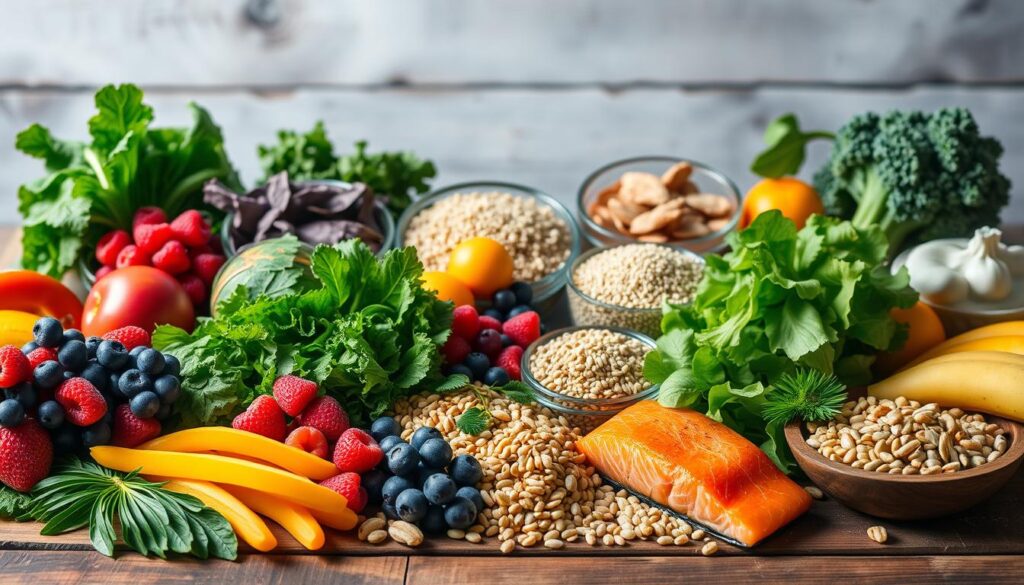Did you know that nearly 70% of adults in the United States are either overweight or obese? This fact shows how important it is to find Weight Lose Diets that help with weight loss and support healthy living1. It’s key to choose diets that you can stick with for a long time, not just quick fixes that don’t last2.
Learning about balanced nutrition and staying active can help you find the best diets for losing weight. This way, you can reach your health goals without harming your health. In this article, we’ll look at different diets and their benefits. We aim to give you the info you need to make smart choices for a healthier life.
Key Takeaways
- Over 70% of U.S. adults are overweight or obese, stressing the need for effective weight lose diets.
- Focus on sustainable healthy eating plans rather than fad diets.
- Long-term changes in lifestyle are crucial for successful weight management.
- Understanding nutrition can guide you to the best diets for weight loss.
- Effective weight lose diets support overall health alongside weight loss.
Understanding Weight Loss and Health
Understanding how weight loss relates to health is key for a successful journey. Many people learn that there’s no single best way to lose weight. Our bodies react differently to foods due to our genes and health status3. You might find some diets work for you, but not others.
Learning about diet and nutrition tips helps you know what’s best for your body. For lasting weight loss, swap calorie-heavy foods for ones that fill you up but have fewer calories3. Slow, steady weight loss of 1 to 2 pounds a week is more likely to be kept off than quick losses4. Keeping track of your progress and adjusting your goals is important for success.
Many eating habits come from emotional triggers like stress or boredom. Emotional eating, eating when stressed or bored, can slow down weight loss3. So, it’s important to find healthier ways to cope.
Getting enough sleep is also key for managing weight. Not sleeping well can mess with your hunger control and motivation for healthy eating4.
Eating a balanced diet helps with weight loss and overall health. The Dietary Guidelines recommend about 5-7 ounces of protein a day for adults. Protein is key for a healthy diet5. Trying diets like the Mediterranean diet, with healthy fats and lots of fruits and veggies, can also help your weight loss.
Key Components of Effective Weight Lose Diets
To lose weight for good, it’s key to know the key components of good diets. A balanced diet includes fruits, veggies, whole grains, and healthy fats. This mix helps cut down on processed foods with lots of sugar and salt, which is good for healthy eating plans.

Only a small number of people manage to lose weight and keep it off, about 1 to 3 percent6. This shows how important it is to follow structured diet and nutrition tips to reach weight loss goals. Things like genes and the environment also affect weight, making tailored diet plans crucial6.
If you’ve been inactive, start with 30 minutes of exercise a day to get moving6. Adding exercise to a healthy diet helps a lot, leading to a 7.2 kg weight loss over 6 months to 3 years6. Changing how you eat and move is key to losing weight, with a focus on eating less6.
Behavioral treatments for weight control usually last 12 to 20 weeks, aiming for a slow weight loss of 1 to 2 pounds a week6. A study in 2014 looked at different diets and found big differences in how much weight people lost7.
| Diet Program | Efficacy Level | Study Reference |
|---|---|---|
| Low-Carbohydrate Diet | High | DIETFITS (2018) |
| Low-Fat Diet | Moderate | DIETFITS (2018) |
| Very-Low-Energy Diet | Effective | Parretti et al. (2016) |
| Popular Diets | Variable | Anton et al. (2017) |
Exploring Popular Weight Lose Diets
Choosing the right diet can greatly affect your weight loss journey. The Mediterranean diet is a top choice, linked to lower chronic disease risk and longer life expectancy8. It also helps with keeping weight off, as seen in a study with over 500 adults8. The DASH diet is another great option, known for lowering blood pressure and heart disease risk8. It was found to lead to more weight loss than a control diet in 13 studies8
The flexitarian diet combines plants and some meat, lowering type 2 diabetes risk and boosting metabolic health9. The MIND diet can also reduce Alzheimer’s disease risk and improve thinking skills in older adults8. The keto diet was very popular in 2020, being the most searched diet in the U.S9.. The Whole30 diet focuses on strict food choices for a month, attracting those seeking quick results9.
It’s important to consider the cost of diet programs too. Prices range from about $20 to hundreds of dollars a month, depending on the support level10. The Mayo Clinic Diet is known for its thorough approach, promoting daily exercise as advised by the CDC10. Whether you choose a detailed plan or something more flexible, the goal is to find a diet that meets your health goals.
The Mediterranean Diet: A Heart-Healthy Choice
The Mediterranean diet is a top pick for losing weight and staying healthy. It’s been named the best diet by the U.S. News and World Report for years11. It focuses on eating lots of plants like veggies, fruits, beans, and whole grains. This matches the American Heart Association’s (AHA) healthy eating advice12.
Eating like the Mediterranean can make your heart healthier. Studies show it lowers the risk of heart disease. People who eat this way get to enjoy healthy fats from olive oil and nuts12. Also, eating well in middle age can lower the chance of getting dementia later11.
This diet is good for your heart because it includes omega-3 fatty acids from fish. These fats help prevent stroke and heart failure. Drinking red wine is okay, but only in small amounts12.
The Mediterranean diet is all about eating high-quality foods and avoiding junk food. It’s different from diets like paleo or keto, which might not be as good for your heart11.

The DASH Diet: Balanced Eating for Weight Loss
The DASH diet helps you eat well and lose weight while lowering blood pressure. High blood pressure affects nearly half of the world’s people, and over 60% of those over 60 get it13. The diet focuses on fruits, veggies, whole grains, and low-fat proteins. It also cuts sodium to 1,500 milligrams a day1314.
This diet suggests eating certain amounts each day. Aim for 6-8 whole grains, 4-5 veggies, and 4-5 fruits15. Include 2-3 servings of low-fat dairy and 6 or fewer servings of lean meats and fish14. It’s good to eat nuts, seeds, and legumes but limit processed foods, fatty meats, and sugars14.
Research shows the DASH diet aids in weight loss and lowers diabetes and heart disease risk. A 2020 study found it helped older adults lose body fat13. Recent studies also show it can cut belly fat and lower metabolic syndrome risk by almost 50%1314.

| Food Group | Recommended Servings |
|---|---|
| Grains | 6-8 servings |
| Vegetables | 4-5 servings |
| Fruits | 4-5 servings |
| Dairy (fat-free or low-fat) | 2-3 servings |
| Lean meats, poultry, and fish | 6 or fewer servings |
| Nuts, seeds, legumes | 4-5 servings per week |
| Fats and oils | 2-3 servings |
| Candy and added sugars | 5 servings or fewer per week |
The MIND Diet: Nourishing Your Brain
The MIND diet is a special way to boost brain health and help with weight loss. It combines parts of the Mediterranean and DASH diets for better brain function. Studies show it can lower the risk of Alzheimer’s disease by up to 53% for those eating the most MIND foods1617.
Leafy greens and berries are key to the MIND diet for brain health. Eating berries helps keep the brain sharp, showing the diet’s power in fighting cognitive decline17. The diet also suggests cutting down on butter, red meat, and sweets to protect the brain. These foods can harm brain health by causing stress and inflammation17.
A 2023 study showed that following the MIND diet led to a 11-pound weight loss and better diet quality16. By eating the foods the MIND diet recommends, you help your brain and body stay healthy. This can lead to a better future for your health.
Intermittent Fasting: A Flexible Eating Approach
Intermittent fasting is a way to eat that can help with weight management. It involves not eating for certain periods. This method triggers hormonal changes that aid in losing weight and lower the risk of health issues like diabetes and heart disease18.
The 16/8 method is a popular choice. It means eating during an 8-hour window and fasting for 16 hours. This approach can help prevent high blood pressure and cut down on how much you eat, aiding in weight control18. Many studies show it has health perks, like better heart health and sharper mind19.
Research shows that fasting can lead to weight loss of 0.8% to 13.0% of your body weight in 2 to 12 weeks18. A study in the New England Journal of Medicine highlights the long-term health benefits of fasting. It suggests it can help you live longer and improve your brain function19.
But, fasting isn’t right for everyone. It’s not good for kids, pregnant or breastfeeding women, or those with eating disorders18. To make fasting work in a busy life, plan ahead.
Here are some tips to get the most out of this method:
- Start with shorter fasting periods.
- Drink lots of water when you’re not eating.
- Choose foods rich in nutrients when you eat.
- Pay attention to your body and adjust your fasting schedule as needed.
Plant-Based Diets: Focusing on Nutrition
Plant-based diets offer many benefits beyond just losing weight. They help with weight loss and lower the risk of chronic diseases. Vegetarian and vegan diets are linked to fewer cases of obesity, diabetes, and other health problems20.
These diets are full of fiber and nutrients. Foods like fruits, veggies, whole grains, and beans are packed with fiber and essential nutrients. Studies show that eating a lot of fiber helps with weight loss and overall health21 and20.
To make sure you get all the nutrients on a plant-based diet, eat a variety of foods. Important tips include:
- Eat many vegetables to get vitamins and minerals.
- Choose whole grains for energy and fiber.
- Add protein-rich plants like beans, tofu, and nuts to your meals.
- Make sure to get enough vitamins B12 and D, and omega-3 fatty acids with fortified foods or supplements.
Vegetarian diets can help with weight loss, especially for people with type 2 diabetes and heart disease. Many studies show big improvements in health and weight for those on these diets21 and20.
Choosing a plant-based lifestyle means making healthy eating plans that help with weight loss and overall health. It’s more than just dieting; it’s a way to live a healthier, more sustainable life.
Understanding Low-Calorie Meal Plans
Low-calorie meal plans help you reach and keep a healthy weight. They focus on 1,200 calories a day to aid in weight loss through balanced eating22. These plans let you lose 1 to 2 pounds each week by watching your calorie intake23. By choosing nutrient-rich foods, you can feel full on fewer calories.
Many plans focus on foods high in protein and fiber to help you feel full. A good meal plan might include 30 grams of protein and up to 42 grams of fiber daily22. Adding foods like eggs, fruits, and nuts to your meals ensures you get important nutrients while keeping calories low. Some diets even let you have treats, like sweets with no more than 75 calories a day24.
It’s important to know how many calories you need, which changes with your age, sex, and activity level23. To follow a low-calorie meal plan, you should have good diet tips. This might mean slowly increasing your daily activity to at least 30 minutes, which helps with weight loss24. Using a low-calorie meal plan can lead to lasting lifestyle changes, helping you manage your weight and health better.
| Meal Component | Daily Total |
|---|---|
| Calories | 1,200 |
| Protein | 45 g – 66 g |
| Carbohydrates | 139 g – 177 g |
| Fiber | 30 g – 42 g |
| Fat | 32 g – 58 g |
| Sodium | 1,086 mg – 1,741 mg |
Tips for Successful Meal Planning for Weight Loss
Planning your meals for weight loss means using a smart strategy. It’s about knowing what to eat and how to plan your meals. Aim to eat fewer calories than you burn to lose weight25. Eating foods high in protein and fiber helps you feel full and reduces hunger25. Try to avoid processed foods and sugars to see better results25.
For balanced meals, mix your plate with veggies, protein, and whole grains25. Adding different fruits and veggies helps you get all the nutrients you need25.
Keep healthy snacks like nuts or veggies with hummus handy25. Having a variety of meals and following safe food practices helps you stick to your weight loss plan25.
Batch cooking soups and using slow cookers saves time25. Try making homemade pizzas, salads, soups, pasta, or grain bowls to help you stay on track25. Always store and reheat food safely, following the guidelines to keep it fresh25.
Customize your meal planning to fit your life and tastes for better success25. Following these diet and nutrition tips will help you reach your weight loss goals.
| Strategy | Description |
|---|---|
| Caloric Deficit | Aim to consume fewer calories than you burn. |
| Fiber-Rich Foods | Include vegetables, fruits, and whole grains to enhance satiety. |
| Protein Sources | Incorporate lean meats, legumes, and nuts for effective weight management. |
| Meal Variety | Change up your meals to keep it interesting and satisfying. |
| Safety First | Follow food safety guidelines when storing and reheating meals. |
Conclusion
Starting a weight loss journey means understanding different diets and their lasting effects. It’s key to pick a diet that fits your life and tastes, making it easier to stick with. Sadly, 95% of diets don’t work out, and many people gain back the weight they lost soon after stopping their diet26. This shows we should aim for steady habits over quick fixes.
It’s also vital to know how mental health and eating habits play a role in keeping weight off27. By eating well and staying active daily, you’re not just losing weight. You’re improving your health overall. The best diets are those you can keep up with, helping both your body and mind.
Remember, knowing how hard it is to keep weight off after dieting can help you make better choices26. Factors like stress and metabolism matter too. Start making changes now to support your health goals. This will improve your life quality.











